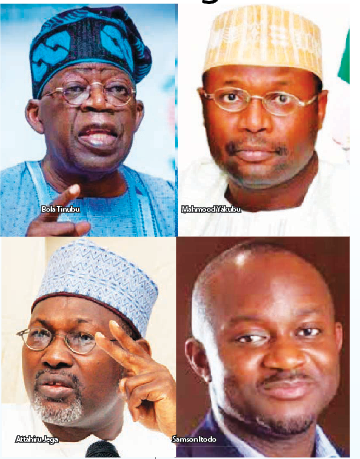News
Case For Electoral Reforms Gathers Momentum

Nigeria’s recent elections have been a major topic of conversation, sparking widespread debate and criticism over the electoral process. With growing concerns about the integrity, transparency, and efficiency of elections, the call for comprehensive electoral reform has gained significant momentum. Citizens, civil society groups, political leaders, and international observers are now pressing for changes to create a fairer, more credible electoral system.
Why Electoral Reform is Needed
The call for electoral reform in Nigeria is not new. The nation has a history of election-related issues, including allegations of vote-buying, ballot box snatching, voter suppression, and violence at polling stations. Each election cycle has typically been marred by controversies that erode public confidence in the system.
Moreover, the recent widespread use of technology in voting and results transmission, while promising, has also exposed areas needing refinement.
A major reason for the demand for reform is the need for an electoral process that is not only secure but also inclusive and accessible to all Nigerians.
Many voters, especially in rural areas, continue to face obstacles to participating in the democratic process due to logistical challenges, insecurity, and misinformation. Political leaders, too, have raised concerns about the impartiality of electoral bodies and called for greater transparency in vote counting and results transmission.
Key Areas for Reform
Several areas of Nigeria’s electoral process have been highlighted for potential reform. These include:
Independent National Electoral Commission (INEC) Reforms: Calls for a more independent and better-funded INEC are at the forefront. Ensuring that INEC is fully independent of political influence is seen as crucial to building public trust in election outcomes.
Voter Registration and Education: Reform advocates are pushing for easier and more accessible voter registration processes, especially in rural and underserved areas. Many also emphasise the need for continuous voter education to reduce voter apathy and make the process clearer for all citizens.
Electronic Voting and Result Transmission: With the increased role of technology, many Nigerians are calling for secure and reliable electronic voting and real-time result transmission. While the 2023 elections saw some electronic enhancements, inconsistent application and technical glitches affected voter confidence.
Political Violence and Security: Security concerns have plagued Nigerian elections for decades. Electoral reforms that ensure adequate security at polling units and stricter penalties for electoral violence could provide voters with the assurance they need to participate without fear
Judicial Process for Disputes: Election disputes in Nigeria often lead to long and contentious court cases. Proposals for reform also include the establishment of a more efficient and independent judicial process for handling electoral disputes.
Voices for Reform
Civil society organisations, such as the Centre for Democracy and Development (CDD) and the Transition Monitoring Group (TMG), have been vocal in pushing for electoral reforms. These groups argue that reform is necessary for Nigeria’s democracy to thrive and gain international respect.
Politicians and former heads of state have also weighed in. Former President Olusegun Obasanjo, for instance, has repeatedly called for a restructuring of the electoral process to reduce the influence of money and power in elections. International observers, including the European Union and other foreign missions, have also highlighted irregularities in Nigeria’s electoral process and advised the government on areas for improvement.
Moreover, Nigerian youth have played a significant role in advocating reform. Many young Nigerians have shown a growing interest in politics, with movements like #NotTooYoungToRun and #EndSARS demonstrating the power of youth voices in shaping the future. The youth want an electoral process they can trust, believing that credible elections are fundamental to building a Nigeria that offers them better opportunities.
The Path Forward: Can Electoral Reform Become Reality?
Achieving electoral reform in Nigeria will not be easy. Reforms require political will, legislative changes, and adequate funding. Lawmakers, who are often beneficiaries of the existing system, may be hesitant to embrace changes that could reduce their influence. However, the pressure from civil society, international bodies, and citizens is strong, and the demand for reform is unlikely to fade.
Proposed amendments to the Electoral Act are already being reviewed by the National Assembly. Advocacy groups are calling on lawmakers to prioritise these reforms to ensure Nigeria’s democracy is not compromised in future elections.
The future of Nigeria’s democracy depends on a fair, transparent, and accountable electoral process. With mounting pressure from various quarters, the movement for electoral reform in Nigeria continues to gather momentum, sparking hope that the upcoming elections will mark a shift towards greater credibility and trust in the democratic process.
Experts Speak on Electoral Reforms in Nigeria
In light of Nigeria’s recent elections, political analysts, civil society leaders, and academics are voicing strong calls for reforms to address persistent issues in the country’s electoral system. Their insights highlight the urgent need for changes that will foster a more transparent, credible, and efficient process, one that can fully support Nigeria’s democratic aspirations.
Key Expert Opinions on Electoral Reforms
Dr. Mahmood Yakubu, Chairman of INEC
Dr. Yakubu has consistently emphasised the need for modernising Nigeria’s electoral system, particularly through technology. He argued that “a more robust use of electronic voting and results transmission could curb irregularities and streamline the entire process.” Dr. Yakubu also stressed the importance of an independent and adequately funded INEC to withstand political pressures.
Prof. Attahiru Jega, Former INEC Chairman
Prof.
Jega, who led INEC during Nigeria’s 2011 and 2015 elections, advocated legislative reforms to empower INEC further and curb election violence. “Strengthening legal penalties for electoral offences and creating a special tribunal to address election disputes swiftly would improve both accountability and confidence,” Jega asserts. He has also pointed out that clearer guidelines for political party financing and more stringent oversight could help level the playing field.
Dr. Aisha Abdullahi, Political Science Schola
Dr. Abdullahi, a lecturer in political science, emphasised the need for better voter education, particularly in rural areas. “Electoral reforms should prioritise creating awareness among citizens about their voting rights and how to detect and report irregularities,” she explained.
Dr. Abdullahi argued that improving civic education could reduce voter apathy, especially among young Nigerians, and increase participation.
Clement Nwankwo, Director, Policy and Legal Advocacy Centre (PLAC)
As a civil society leader, Nwankwo advocated reforms that protect voter security. “We need a comprehensive plan for securing polling units and addressing election violence,” he said, pointing out that intimidation tactics disenfranchise many voters. Nwankwo also recommends clear provisions for punitive measures against those who engage in voter suppression.
Samson Itodo, Executive Director, Yiaga Africa
Itodo, whose organisation focuses on youth participation in politics, has called for reforms to increase transparency in vote counting and result collation. “Election transparency starts with open processes,” he noted. Itodo has also urged that youths be engaged in policy discussions about the reforms, arguing that “the future of Nigeria’s democracy relies heavily on the trust and participation of its youth population.”
Prof. Bolaji Owasanoye, a former Chairman of the Independent Corrupt Practices Commission (ICPC)
Prof. Owasanoye focused on the role of money in Nigerian elections, calling for stricter regulations on campaign financing. “To reduce the corrupting influence of money in politics, we need better oversight on campaign spending and harsher penalties for violations,” he asserted.
According to him, unchecked political financing perpetuates corruption and creates an uneven playing field for candidates.
Common Themes in Expert Recommendations
While experts have diverse perspectives, several common themes emerge in their calls for reform:
Strengthening INEC’s independence: Many believe that granting INEC more autonomy and adequate funding is critical for shielding it from political interference.
Using Technology for Greater Transparency: There is a strong push for electronic voting and results transmission to make elections more efficient and less vulnerable to tampering.
Improving Voter Education: Experts stress the need for ongoing voter education to combat misinformation, increase turnout, and boost overall civic engagement
Enhancing Security: Security concerns are a recurring issue, with experts calling for measures that ensure safe and intimidation-free voting.
Reforming Campaign Financing: Many experts call for stricter oversight of campaign spending to reduce the influence of money on election outcomes and create a fairer political environment.
The Road Ahead
The perspectives of these experts provide a roadmap for comprehensive reforms that could transform Nigeria’s elections. With mounting pressure from civil society and international stakeholders, the time may be ripe for the Nigerian government to push through meaningful reforms that can restore citizens’ faith in the electoral process. As elections are the bedrock of any democracy, experts agree that investing in Nigeria’s electoral integrity is vital for its stability and development.
SOURCE: New Telegraph
-

 News4 days ago
News4 days agoInsecurity: Kogi Schools Resume On Monday
-

 Opinion4 days ago
Opinion4 days agoDon’t Pull the Plug: Why Nigerians Are Pleading for the U.S. to Extend Its Police Training Program — and Why It Must Synergize With New Military Arrivals
-

 Crime3 days ago
Crime3 days agoVigilante Reportedly Shoots Colleague Dead In Plateau
-

 Crime4 days ago
Crime4 days agoMan Shot Dead In Ambush Along Jol-Sho Road In Plateau



